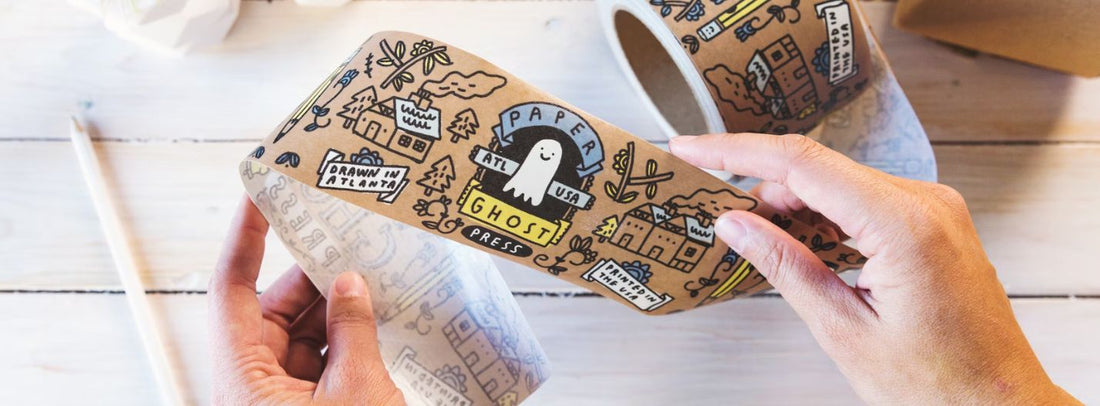Paper tape, often touted as an eco-friendly alternative to plastic, has seen a surge in popularity. Yet, the question of its recyclability lingers. Is paper tape recycle? This article delves into the complexities surrounding paper tape recycling, examining its composition, the challenges faced by recycling facilities, and potential solutions. By understanding the environmental implications of paper tape, individuals and businesses can make informed decisions about its use and disposal.
- Paper Tape vs Plastic Tape: Which Should You Choose?
- 9 Common Types of Tape That You Should Know
- Heat-Resistant Tape: A Comprehensive Guide for Business
Understanding Paper Tape Composition
Paper tape is a seemingly simple product composed of two primary elements: paper and adhesive. The paper backing provides the tape’s structural integrity, determining its strength and flexibility. The adhesive, the substance that allows the tape to adhere to surfaces, is crucial in determining its purpose and recyclability.
Several common types of paper tape exist, each designed for specific applications:
- Masking tape, often used in painting or light-duty securing, typically employs a water-based adhesive that can be easily removed without damaging surfaces.
- Packing tape, on the other hand, is designed for shipping and requires a stronger adhesive to withstand transportation rigors. It often uses an oil-based adhesive.
- Duct tape, though commonly associated with a cloth-reinforced plastic version, can also be made from paper. However, paper duct tape typically features a cloth backing and a very strong, often oil-based adhesive, making it less suitable for recycling.
These variations in paper type and adhesive composition significantly influence a tape's recyclability. The type of paper used, its thickness, and the presence of any additives will affect how it can be processed. The adhesive, particularly its chemical makeup, plays a crucial role in determining whether it can be separated from the paper during recycling or if it contaminates the process.

Recycling Paper Tape: Challenges and Possibilities
Recycling paper tape presents significant hurdles due to its composition and the limitations of existing recycling infrastructure.
- Adhesive residue: The primary challenge lies in the adhesive used. Most paper tapes employ adhesives that are difficult to separate from the paper backing during the recycling process. These adhesives can contaminate the paper pulp, reducing the quality of the recycled paper and potentially rendering it unusable for certain products.
- Contamination: Another obstacle is the potential for contamination. Paper tape often comes into contact with various substances during use, such as dirt, grease, or paint. These contaminants can interfere with the recycling process and further diminish the quality of the recycled material.
While the challenges are substantial, some progress has been made in recycling paper tape.
- Recycling facility capabilities: A limited number of recycling facilities possess the specialized equipment and processes required to handle paper tape effectively. These facilities often have strict guidelines regarding tape type, adhesive composition, and contamination levels.
- Impact on recycling processes: The presence of paper tape can disrupt the standard recycling workflow. Extra steps, such as manual sorting and cleaning, are necessary to remove the tape and prepare the paper for pulping. This added labor and time can increase recycling costs and reduce overall efficiency. Moreover, if not properly processed, paper tape can lower the quality of recycled paper, limiting its potential applications.
So how to recycle paper tape? In the next section, let’s find out how you can recycle paper tape.
How to Recycle Paper Tape Effectively
Recycling paper tape presents unique challenges due to its adhesive properties and potential contamination. However, by following these steps, you can significantly increase the chances of successful recycling:
Preparing Paper Tape for Recycling
- Remove adhesive residue: Carefully peel off as much adhesive as possible from the paper tape. For stubborn residue, consider using a solvent-free adhesive remover.
- Separate from other materials: Ensure the paper tape is free from plastic, metal, or other contaminants that can disrupt the recycling process.
- Compact the tape: For larger pieces of tape, balling them up tightly can reduce their volume and make them easier to handle.
Finding Recycling Facilities
- Contact local recycling centers: Inquire about their acceptance of paper tape. While many facilities accept paper products, not all can process paper tape with adhesive.
- Explore specialized recycling programs: Research recycling programs or companies that specifically handle difficult-to-recycle materials like paper tape.
- Check for community initiatives: Some communities have organized paper tape recycling drives or collection points.

Supporting Recycling Initiatives
- Advocate for recycling programs: Contact your local government or waste management authorities to encourage the inclusion of paper tape in recycling programs.
- Support eco-friendly businesses: Choose businesses that use and promote recyclable paper tape or offer recycling options for their packaging.
- Educate others: Spread awareness about the importance of recycling paper tape and proper disposal methods to inspire change within your community.
By taking these proactive steps, you can contribute to a cleaner environment and encourage the development of more sustainable recycling practices for paper tape.
Conclusion
Recycling paper tape is challenging due to adhesive residue and contamination. While possible, it requires specialized facilities and preparation. To minimize impact, reduce tape use, explore reusable or eco-friendly alternatives, and support recycling initiatives. Remember, recycling is part of the solution; reducing and reusing are equally important.




